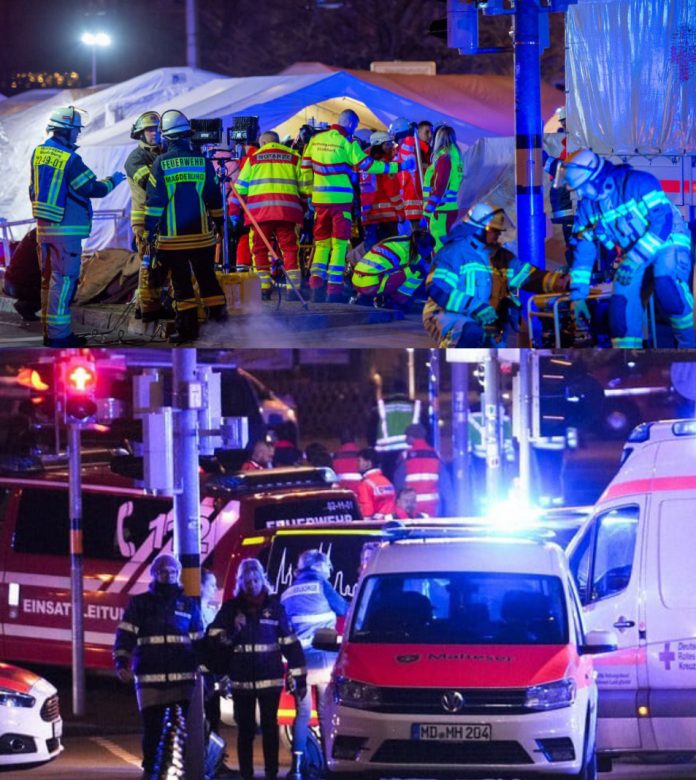Let us start at the crux: How the hate spewers, many who are very likely state-employed, are responsible for the division and hate that leads to murder:
The Consequences
The attack at the Magdeburg Christmas market has shaken Germany, leaving five dead and over 200 injured. As investigators piece together the motives and missed warnings surrounding the accused perpetrator, Taleb A., questions are emerging about the broader societal and political context that allowed such a tragedy to unfold. Specifically, it is crucial to examine how far-right hate, fuelled by misinformation and radical ideologies, can act as a catalyst for horrific acts of violence.
A Suspect Shaped by Far-Right Extremism
While Taleb A. defies conventional categorisation, his ideological affiliations with far-right hate groups like the Alternative for Germany (AfD) underscore a troubling trend. Often branded as a populist party, the AfD has faced accusations of normalising xenophobia, Islamophobia, and ultranationalism within mainstream discourse. Despite being a migrant himself, Taleb A. reportedly harboured “Islamophobic” views and consumed far-right propaganda that amplified fears of cultural and racial “replacement.”
The confluence of ideological confusion and hate-driven misinformation may have played a key role in pushing him towards violent extremism. Federal Interior Minister Nancy Faeser highlighted the unprecedented nature of the case, noting:
“This perpetrator acted in an unbelievably cruel and brutal manner; he was clearly ideologically hostile to Islam.”
Such contradictions reflect how the far right’s toxic narratives can weaponise disillusioned individuals, creating fertile ground for violence against the very communities they demonise.
The Role of Far-Right Hate and Misinformation
Far-right movements thrive on fear and polarisation, often using crises to scapegoat minorities and immigrants. Over the past decade, Germany has seen a resurgence in far-right extremism, exacerbated by social media algorithms that prioritise inflammatory content and spread misinformation. This digital ecosystem fosters radicalisation, enabling individuals to access conspiracy theories and violent propaganda at unprecedented speeds.
Recent Examples of Far-Right-Inspired Violence
- Christchurch Mosque Attacks (2019): The Australian gunman responsible for killing 51 people in New Zealand cited far-right ideologies, including the “great replacement” theory, as his motivation. He even live-streamed the massacre, seeking to amplify his hateful message globally.
- Hanau Shootings (2020): In Germany, a far-right extremist attacked two shisha bars, killing nine people of immigrant descent. His manifesto contained racist conspiracy theories and calls for ethnic cleansing.
- Pittsburgh Synagogue Shooting (2018): The shooter, a vocal anti-Semite radicalised online, targeted worshippers at a synagogue, killing 11 in the deadliest anti-Jewish hate crime in U.S. history.
- Norwegian Government Attack and Utøya Massacre (2011): Anders Behring Breivik killed 77 people in Norway, motivated by anti-Muslim sentiment and a desire to punish those he deemed responsible for “multiculturalism.”
In each case, far-right ideologies provided a framework for the perpetrators to rationalise their violence, often under the guise of defending their nation or culture.
Exploitation of Tragedy by the Far Right
In Magdeburg, the tragedy has been further weaponised by far-right groups seeking to advance their political agenda. Following the attack, around 2,000 far-right protesters marched through the city, many wearing black balaclavas and carrying banners demanding “remigration.” This term, a euphemism for mass deportation, reflects the ideology of groups that view immigrants and minorities as existential threats to the nation.
Rather than mourning alongside the community, these protesters sought to inflame tensions and reinforce divisions. Such actions highlight how the far right capitalises on fear and uncertainty to promote xenophobic policies, often framing themselves as protectors of “ethnic purity” and national identity.
A Community in Fear
For immigrants and people of colour in Magdeburg, the attack and its aftermath have created an atmosphere of heightened fear. Syrian-born resident Batoul Nayouf described escalating hostility, including verbal abuse and physical aggression.
“We are frightened. As immigrants, we are witnessing an extreme wave of hate speech. We are witnessing even violent acts against immigrants.”
Such experiences are not isolated. Germany’s Federal Office for the Protection of the Constitution has reported a steady rise in far-right hate crimes, including attacks on refugee shelters, religious institutions, and individuals perceived as foreign.
The Broader Risks
Far-right hate does not operate in a vacuum. It feeds off societal inequalities, economic anxieties, and political instability. As Germany approaches a general election, there is a real risk that the Magdeburg attack will be exploited for political gain. Far-right parties may use the tragedy to argue for stricter immigration controls, increased surveillance, and divisive policies that further marginalise vulnerable communities.
Moving Forward
To prevent future tragedies, it is essential to confront the root causes of far-right extremism:
- Stronger Regulation of Online Platforms: Social media companies must take greater responsibility for moderating hate speech and preventing the spread of radicalising content.
- Investments in Education and Awareness: Schools and community organisations should focus on countering misinformation and promoting critical thinking about far-right ideologies.
- Robust Intelligence Sharing: Authorities must enhance cooperation to track and respond to potential threats, ensuring that flagged individuals like Taleb A. are not overlooked.
- Community Engagement: Building bridges between diverse communities can reduce polarisation and create a united front against hate.
As Magdeburg mourns, the challenge lies in ensuring that this tragedy does not deepen divisions or embolden extremists. The fight against far-right hate requires vigilance, compassion, and a commitment to protecting the values of inclusion and democracy that are fundamental to any society.







